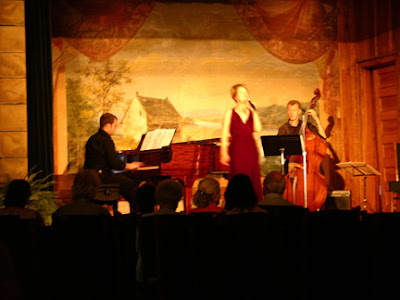 People, I need help! How do I widen the margins of this part of my blog?? I have looked in the help section but couldn't figure it out. If anyone knows can you email me?? It's driving me crazy !!
People, I need help! How do I widen the margins of this part of my blog?? I have looked in the help section but couldn't figure it out. If anyone knows can you email me?? It's driving me crazy !!




I ushered in the month of June in the pastoral town of Foxburg, PA. Set on the Allegheny, this sleepy village consists of the Foxburg Inn, (est. 2006- where we stayed), the Allegheny Grille right next door, the Free Library- built in 1909, complete with charming small theatre, the Foxburg Winery and two antique shops. D had a gig with the lovely Daphne Alderson, who tells wonderful stories about Marlene Dietrich and Edith Piaf interspersed with singing their songs in her contraalto voice.
So, we arrived Friday afternoon- the air smelled sweet and clean, green trees lined our way. The inn sits right on the river, which was placid the whole weekend and reflected the woods as clearly as a mirror. Friday and Saturday night the band performed, and the rest of the time consisted of eating, taking in the scenery, and a nice 3 mile walk around a trail where we saw a frog and horseshoe prints in the mud. It was pleasant except for all the gnats that were flying around our faces.
Today, I am back at work at City Theatre. It's a quiet day and I thought I would catch up on the blog.
I finally secured a studio space! I haven't had an opportunity to move any supplies in yet but I am chomping at the bit to start work! CHOmping at the bit!
I am reading
The Omnivore's Dilemma by Michael Pollan - he sometimes writes about food for the NY Times and this book is terrible and fascinating...Terrible to learn about the Agricultural practices employed in the US, and what little choice we have when it comes to sustainable/organic food bought in the mainstream grocery and fascinating to see how mother nature battles big industry and loses and how we as a nation lose out because of it.
The part that has captured me most entirely is when Pollan discusses the writing of Sir Albert Howard (1873-1947).
Pollan says:
"The philosophy underlying Howard's conception of organic agriculture is a variety of pragmatism, of course, the school of thought that is willing to call "true" whatever works. Darwin taught us that a kind of pragmatism--he called it natural selection-- is at the very heart of nature, guiding evolution: What works is what survives.....In Howard's agronomy, science is mostly a tool for describing what works and explaining why it does. As it happens, in the years since Howard wrote, science has provided support for a great many of his unscientific claims: Plants grown in synthetically fertilized soils
are less nourishing than ones grown in composted soils; such plants are more vulnerable to pests and disease.......the health of the soil, plant, animal, human, and even nation are, as Howard claimed, connected along lines we can now begin to draw with empirical confidence. "
I thought this was really interesting-- a holistic worldview which I can relate to --the health of the soil directly relates to the health of the population--look at all of our landfills, pollut lands and waters and the disposable culture in which we live..... this was leading me to another observation and it just fell out of my head....oh well. Pollan calculates that if the 16 million acres currently used to grow corn for cows (which they are not biologically meant to eat) were instead transformed into well-managed grass pastures 14 billion pounds of carbon would be removed from the atmosphere each year. That is the equivalent removing 4 million cars from the road. wow-- that is an astounding number.








